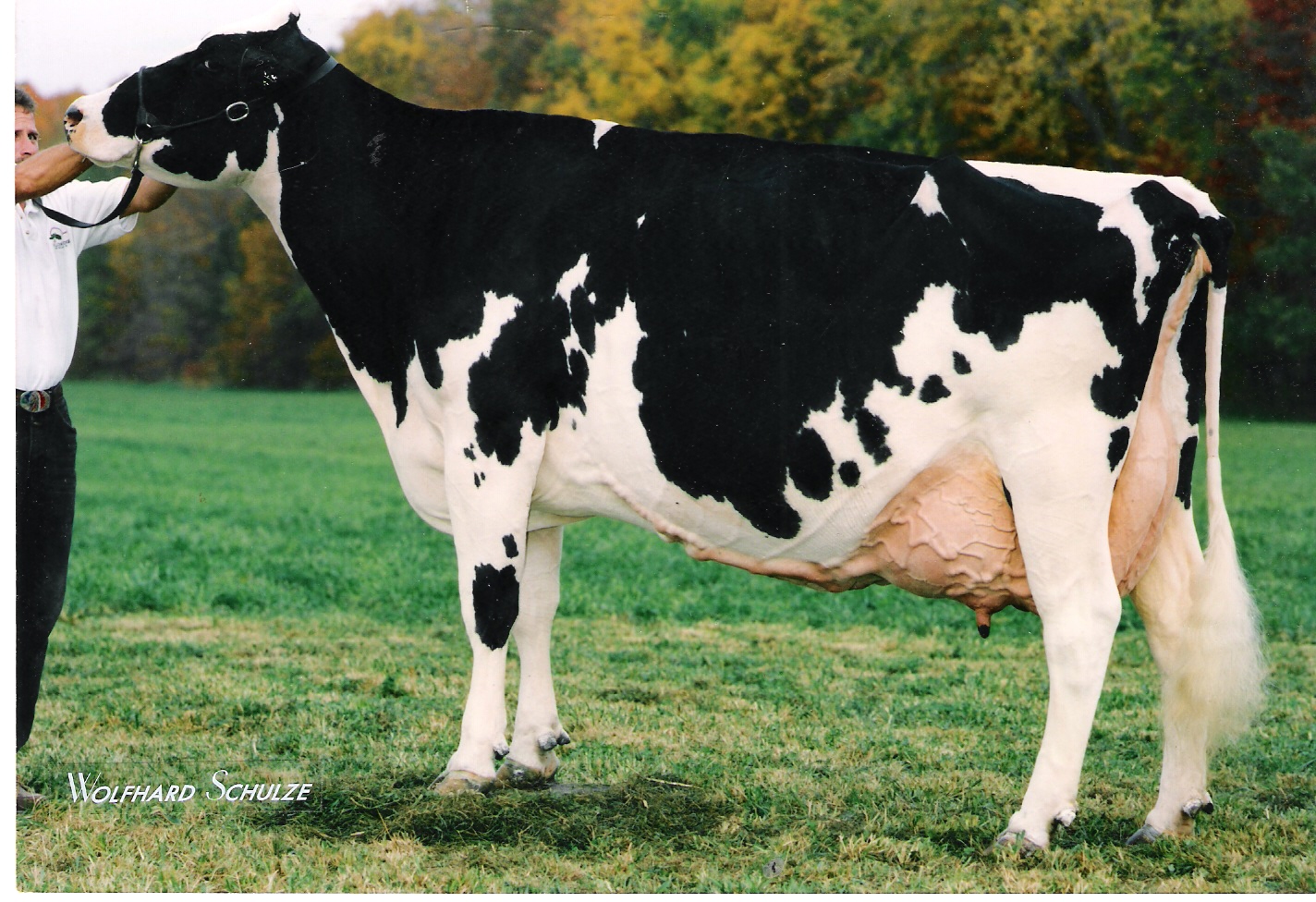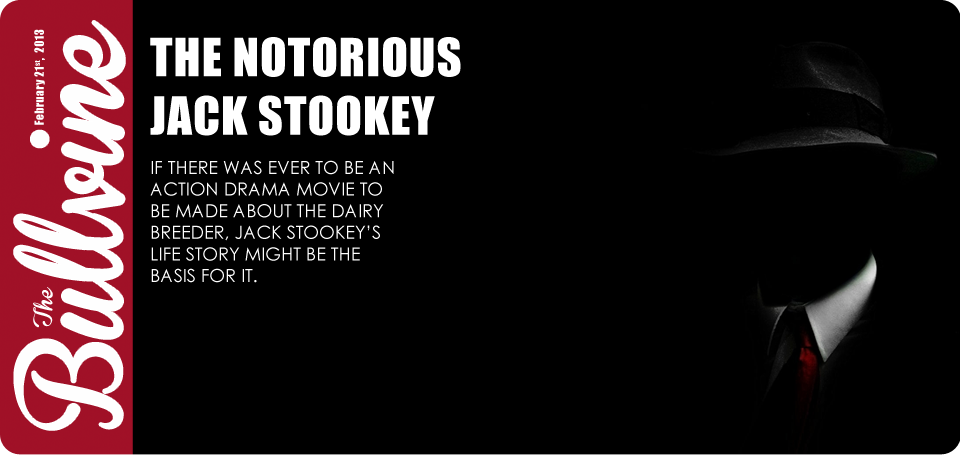By all accounts Jack Stookey came from good stock. His parents were hard working folks that were well respected by the community. Little did they know that their youngest child would have such an illustrious career that would see Jack Stookey go down in the history books as one of the most notorious in the history of the Dairy Industry.
While Jack’s oldest brother, Dr. George Stookey, discovered fluoristan, the substance in toothpaste that prevents cavities and sold his patent to Proctor & Gamble and made a fortune in royalties, Jack was destined for a very different future. As is typical with the youngest child, Jack could do no wrong in his mother Mary Stookey’s eyes. He was the golden boy that, when his first wife didn’t meet up to his mother’s expectations, she urged a divorce and Jack went along with her request.
Fortunately he got it right with his second wife, Darla, and she helped straighten him out. You see it all started out great. Jack had followed a successful career path from the start. He had graduated high school where he was a track and field star and as a result had received a scholarship to Wayland Baptist University, where he set athletic records. However, it’s after university where Jack’s true love for excitement started to show. He began to indulge in his passion for auto racing. Before long he was designing his own cars, building them from scratch and driving them in races. It was here where wife Darla put her foot down and protested his love of racing. So Jack quit the car racing business and went back to the family farm.
Jack’s parents Emra and Mary had started with very little and built their farm into a 1,500-acre show place. The Holstein herd was one of the best in the state and by 1980 there were 31 Excellent and 33 Very Good females. At the urging of son Jack, Emra sold the herd at its peak and the farm auction averaged $4,381.00 on 124 head with a top price of $21,000 for VT-Pond-View Bootmaker Lassi (EX). Six head sold for five figure prices.
Jack’s New Vision
The dispersal was promoted by Jack’s newfound vision. He wanted to start an investment herd. You see the US government had introduced Section 46 of the Internal Revenue Code that allowed for an investment credit which held interest for individuals earning $500,000 a year and upwards. Section 46 created a frenzy of activity the likes of which the industry had never seen before. It introduced an investment purchase credit, a tax write-off which permitted a taxpayer to offset against personal income the costs of investment in certain classes of livestock. A participating individual could purchase a beef or dairy animal by making a nominal down payment and then take a promissory note to pay the balance off over a specified time, usually three years. The tax credits received during that period would cover the cost of the cow. Accountants, lawyers, and other rich individuals were quick to act. Jack Stookey saw this as his opportunity to assemble a group of the best Holsteins that North America had to offer and gave him the opportunity to make a ton of money.

Continental Scarlet-Red
EX-95-3E (USA)
The first cow Stookey bought was Georgian Quality Pat EX-96-4E @ 5-09 (USA) who he purchased from Charlie Auger, who was a 3X All-American Nominee in Milking Form. To publicize his purchase Jack began showing at the major shows. Success was almost instant. In 1983 he took home the Premier Exhibitor banner at Central National Show and come very close to doing it at the Eastern and Western Nationals as well. One of the corner stones to his show string was Continental Scarlet-Red (EX) who he had seen the year earlier at the Royal where Scarlet had won her place in the history books as the only cow ever to defeat the greatest show cow in history, Brookview Tony Charity, who was reserve grand to Scarlet’s grand championship. However, Scarlet didn’t beat Charity in class, as Charity was a 4yr old and Scarlet was a 5yr old at the time. Another great red cow that Jack had purchased from David Brown (and only made the first payment on) was Nandette TT Speckle-Red (EX) giving Jack two of the greatest Red and White cows of the 1980’s.
Enter the IRS
Then as is always the case, the Internal Revenue Service (IRS) came calling. They didn’t approve of these cattle investment tax shelters and in the early 1980’s they had started doing audits. Clearly in their sights was Jack Stookey. Once you are in their sights life becomes very challenging. They disallowed many of his tax loss claims and asked him to make good on his back taxes. The claim which was in the six figures caused a great problem for Jack as he didn’t have the money and had no prospects of getting it. The flow of investor money was slowing and his herd wasn’t generating much revenue.
Jack had hit the bottom. On a winter’s day in 1985 Jack couldn’t even pay his hired help. Therefore, he instructed them to take all the bull calves to the slaughterhouse in order to get some money. Among them were three sons of Scarlet by Roybrook Telstar, that had been scheduled to be sampled by AI units. Then there was his neighbor Mr. Van Forest and his son. Due to friendships with Jack’s parents, when Jack asked them to take care of 80 bred heifers, he agreed. After a year of feeding, time and trouble all Van Forest received was a worn-out semen tank. He lost his farm over the deal. To make matters even worse, during a blizzard in 1985 a hundred Stookey calf hutches were buried in the snow. They didn’t get the calves dug out in time and they all suffocated. Included were 18 calves by Enhancer from Scarlet.
It was at this time that the rumors really started. Rumors such as that Stookey had purchased a bunch of high priced cattle from Canadian breeders and when they discovered that their checks were no good, they stopped the cattle at the border. Another very tasty rumor was that a disgruntled investor had dynamited the porch off Stookey’s house. That’s when the world really started to cave in for Jack. The IRS filed a lien for back taxes forcing Jack to file bankruptcy. The bankruptcy trustee took possession of Stookey’s assets and this caused some more legal issues for Jack. Because Jack had only made the first payment on a number of the cattle, the breeders of these cattle were claiming their animals still belonged to them. Even though these breeders had some pretty tightly worded contracts, the bankruptcy trustee decided that this claim came after that of the unpaid vendors’ liens and hence the breeders never saw the rest of their money.
Wasted Potential
Seeing all this happening and deploring the waste of all these superior genetics, Louis Prange of Elm Park Farms, made a deal with the trustee whereby he took a couple of dozen Stookey cows and put them on a flush program. Prange was to receive one-third of the sale revenue from the resulting calves, the trustee was to receive a third, and Stookey the remaining third. This turned out to be a great move as one of the donors was Nandette TT Speckle, whom he flushed to Blackstar, resulting in one of the greatest type-breeding cows in history Stookey Elm Park Blackrose.

Stookey Elm Park Blackrose EX-96 3E GMD DOM
• All-Time All-American Jr 2-Yr & Jr 3-Yr-Old Cow
• Res All-American 5-Yr-Old Cow 1995
• All-American Jr 3-Yr-Old Cow 1993
• All-American Jr 2-Yr-Old Cow 1992
• Grand Champion, Royal Winter Fair 1995
• Over 30 Excellent Sons and Daughters!
Another would be participant in salvaging what was left was Randy Frasier. You see Jack maintained that he still owned the family farm and he undertook selling it to Randy for his Elmvue herd. Frasier invested $85,000 in fixing the buildings and whatnot and when he was told all was for naught –Frasier was left with nothing for his efforts.
The Bullvine Bottom Line
Jack Stookey’s investor business lasted just about four years between 1980 and 1984, but man was it an eventful time. The investment tax credit was repealed in 1986, but that was not the downfall for Stookey. It was Jack himself that led to his own demise. When Jack was convicted of fraud and embezzlement, the Judge let him serve his sentence on weekends.
However, it didn’t end there. In 20074an article appeared in one of the Indiana farm papers about Jack Stookey’s recent suicide. Then all sorts of rumors started to fly. One such rumor was that Jack was involved with Colombian drug traffickers and was behind in his payments, so they gave him an ultimatum, he could either pull the trigger himself, or they would do it for him. It seems more likely that it was just that, a suicide. You see the IRS had never lost sight of Jack and in 2004, the year he died, they were ready to pounce. They had a tax arrears claim that came to $1.5 million. They ran the man to the earth and then they started their prosecution. It was more than a reasonable man could be expected to take. Though there were many interesting events throughout Jack’s career, this is for sure one of them. Jack Stookey can take credit for the two best animals to come out of the investment era, Stookey Elm Park Blackrose and Stookey Fagin Scarlet, the first red and white cow to make 50,000 lbs of milk. If there was ever to be an action drama movie to be made about the Dairy Industry, Jack Stookey’s life story might be the basis for it.


















Leave a Reply
You must be logged in to post a comment.